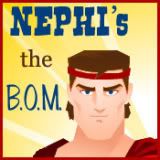When the history of this world is finally written up with an eternal perspective, many events will vie as being worthy to be included. However, because of their significance to every person who has ever lived on this earth or who will ever live on it, the events of the last week of the Savior’s life—from the Sunday morning of his triumphal entry into the city of Jerusalem to the Sunday morning of the resurrection—will undoubtedly be acclaimed as the greatest week in history. Without the events of that week, particularly those which took place in the Garden of Gethsemane and at the time of the resurrection, everything else is virtually meaningless.
Obviously an article such as this could barely list, let alone discuss, all the week’s events that are recorded in the scriptures. Thus, the article will discuss in some detail only one or two events from each day, and it will mention only briefly some of the others.
Near the village of Bethphage, he dispatched some of his disciples to obtain a small donkey for him so he could enter Jerusalem seated on the donkey; this act would not only fulfill the prophecies but would also indicate that he came in peace.
Matthew records that “a very great multitude” had come out to greet the Master, spreading their garments and the branches of trees before him and crying, “Hosanna to the Son of David: Blessed is he that cometh in the name of the Lord; Hosanna in the highest.” (Matt. 21:8–9.)
All of these acts were symbols of respect, and the use of the title “Son of David” indicated that the multitude accepted the Savior as the long-awaited Messiah, for this was the sacred title reserved for the Messiah.
And why shouldn’t the common believing people be ready to accept Jesus Christ as the Messiah? Did he not fulfill the words of their prophets? Was he not a descendant of Judah through the loins of David, just as their prophets had said? Had he not been born of a virgin named Mary in the city of Bethlehem?
Had he not come forth out of Egypt, been reared in Nazareth, proven his mastery over the elements of the earth and the human body by changing the water to wine, by stilling the wind, by calming the waves, by causing the lame to walk, the blind to see, and the deaf to hear, and by bringing the very dead back to life again—all as part of the “mighty miracles” the prophets had said he would perform? And here he was, seated on the foal of an ass, entering into the holy city of Jerusalem just as their prophet Zechariah had foretold.
No wonder the common people followed him in great multitudes, greeting him as the Messiah, the “Son of David.” Evidently many of the people expected him to now go into the city and fulfill some of the other prophecies stated about him, including his taking possession of the armies of Israel and leading them to victory over their enemies and then establishing a reign of peace and justice and righteousness upon the earth. He had fulfilled the words of the prophets with his past deeds; surely he would now fulfill the remainder of their words.
As history and the prophets have indicated, the tragic mistake made by the believing Jews at that time was that they expected the Savior to do at his first coming some of the things that he was to do at his second coming. Jacob, the Book of Mormon prophet, had stated hundreds of years before the birth of the Savior that the Jews would deny the Messiah when he came, because they were “looking beyond the mark.” (Jacob 4:14.)
It was not until later in the week, after the Savior had made such statements as “Render … unto Caesar the things which are Caesar’s” (Matt. 22:21) and “My kingdom is not of this world” (John 18:36) that the people were to change their cries from “Hosanna to the Son of David” to “Crucify him!” It was not until later in the week that the believers among the common people felt he had betrayed them; therefore they agreed to betray him. On that first Palm Sunday, the cries were still “Hosanna to the Son of David.”
These cries were also heard across the valley from the Mount of Olives on the temple mount, where the Pharisees and some of the jealous religious and secular leaders were assembled. Their consternation at this adulation being given the Savior was so great that they exclaimed, “… the world is gone after him.” (John 12:19.)
When the Savior came nearer to Jerusalem, he wept over the city as he contemplated the future destruction that would come upon its inhabitants. His soul continued to be troubled after he had entered Jerusalem; there he prayed, “Father, save me from this hour: but for this cause came I unto this hour.” A voice answered him from heaven, causing some of the people to exclaim that it thundered, while others replied, “An angel spake to him.” (John 12:27, 29.)
Then the Savior gave his discourse on the children of light, reminding the people that the light would be with them only “yet a little while” and admonishing them: “While ye have light, believe in the light, that ye may be the children of light.” (John 12:35–36.) And when “the eventide was come, he went out unto Bethany with the twelve.” (Mark 11:11.)
Daniel H. Ludlow, “The Greatest Week in History,” Ensign, Apr 1972, 34










No comments:
Post a Comment